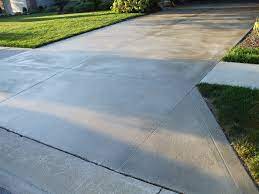Understanding The Impact Of Calcium Chloride In Concrete Driveways

Since concrete is durable & strong, it’s suited to be used for any type of exterior surface, without any issue. Moreover, it’s also one of the most affordable building materials out there. Concrete is traditionally a mixture of water, cement and other aggregates such as rock, sand or gravel. However, adding calcium chloride can help in setting the mixture more quickly while also enhancing its strength. As a result, you can expect your concrete mixture to improve its performance.
According to reliable concrete contractors in Melbourne, calcium chloride helps in enhancing the rate of hydration in cement. Hence, the setting time for concrete gets reduced. Such an effect is more noticeable in cooler weather conditions. Thus, concrete construction can be carried out during the winter & fall season, while also providing quality work.
The Effects Of Calcium Chloride When Using In The Construction Of Concrete Driveways
- The Cement-Water Ratio
With the addition of calcium chloride, you can expect concrete to get stiff at an early stage, which will decrease any chances of bleeding (rise of water content to the top surface).
- The Setting Time
When you add calcium chloride to concrete, you can expect the setting time to greatly reduce. A reduction of up to 2/3rd of the total setting time for concrete is expected when you add calcium chloride into the mix.
For instance, if you add two per cent (in volume) of calcium chloride to concrete, then you can expect the concrete to set at 50 degrees Fahrenheit, which would have instead set at 70 degrees Fahrenheit.
- The Air Involvement
As concrete mixed with calcium chloride doesn’t take much time to cure, you don’t have to rely on air drying the wet concrete.
- The Sulphate Resistance
It should be known that sulphates present in the earth’s environment can easily react with aluminium & calcium ions, which can easily disturb the concrete structure. But, with the presence of calcium chloride in the concrete mix, you can expect to enjoy enhanced resistance in this scenario.
Merits & Demerits Of Using Calcium Chloride With Concrete
Merits
- The initial strength of the concrete structure will be high.
- The concrete setting process will be accelerated.
- Any kind of freeze damage will be prevented.
- Reduction in any concrete bleeding.
- Provides value for money.
- Provides better workability.
- The faster turnaround time.
Demerits
- The addition of calcium chloride to concrete can increase dry shrinkage, which can lead to warping or cracking of hardened concrete.
- A white-coloured residue is formed after the concrete has been cured, which can be eliminated using diluted hydrochloric acid.
- Calcium chloride can lead to the corrosion of any underlying steel structure present in concrete driveways.
How Calcium Chloride Is Added To Concrete?
You must understand that calcium chloride is available in multiple different forms. For example, it can be available in the form of granules or pellets. There’s also the popular flake form. Flake form contains around 77 per cent of calcium chloride.
When adding calcium chloride with concrete, it should be known that the calcium chloride solution shouldn’t come in direct contact with concrete because the concrete will then cure quickly. Instead, the solution should be diluted and then added slowly.
For any additional queries on concrete driveways, feel free to let us know.




Leave a Reply